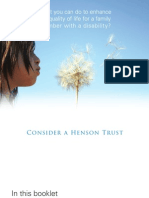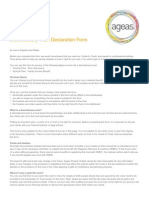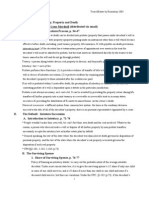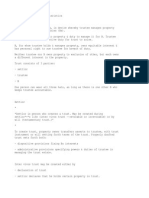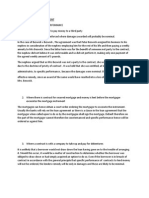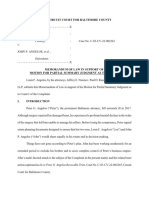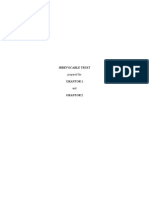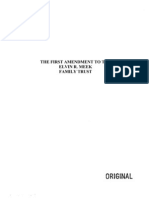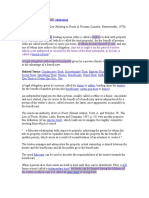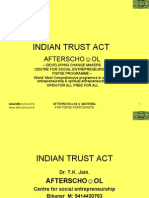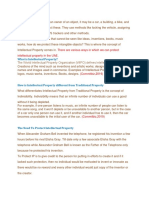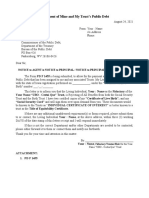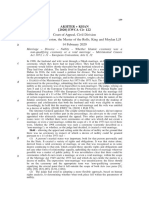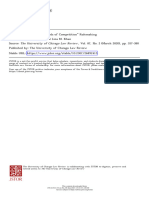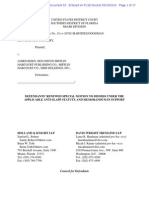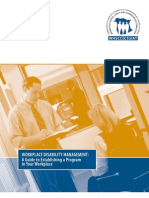Trust Act
Trust Act
Uploaded by
ks136Copyright:
Available Formats
Trust Act
Trust Act
Uploaded by
ks136Original Title
Copyright
Available Formats
Share this document
Did you find this document useful?
Is this content inappropriate?
Copyright:
Available Formats
Trust Act
Trust Act
Uploaded by
ks136Copyright:
Available Formats
[Enter Post Title Here]
<ilayer &bmode=off&bzone=default&bsize=468x60&btype=4&bpos=default&ver=2.0&brefresh=60& SRC="http://www.azagroup.com/ad/adpeeps.php?bfuncti "0" WIDTH="468" HEIGHT="60"></ilayer> btarget=
ers List
Calendar
New Posts
Search
Trusts Act, 1882
THE TRUSTS ACT, 1882
THE Trusts Act, 1882 act No. II of 1882 An Act to define and amend the law relating to Private Trusts and Trustees.
and trustees; It is hereby enacted as follows : CHAPTER I preliminary and it shall come into force on the first day of March, 1882.
as to waqf, or the mutual relations of the members of an undivided family as determined by any custo and nothing in the second Chapter of this Act applies to trusts created before the said day.
ereto annexed shall, to the extent mentioned in the said Schedule, be repealed, in the territories to w
arising out of a confidence reposed in and accepted by the owner, or declared and accepted by him, fo alled the "author of the trust":
ed the "beneficiary ": "trust-money": is his right against the trustee as owner of the trust-property; ared is called the "instrument of trust": y law for the time being in force, is called a "breach of trust": bject or context, "registered" means registered under the law for the registration of documents for the gross negligence, he would have known it, or when informa*tion of the fact is given to or obtained by 1872, shall be deemed to have the meanings respectively attributed to them by that Act. CHAPTER II of THE creation OF trusts se of a trust is lawful unless it is
y law, or
ed for two purposes, of which one is lawful and the other unlawful, and the two purposes cannot be se property is immovable and situate in a foreign country, the law of such country.
e foundlings to be trained up as prostitutes. The trust is void. g business, and out of the profits thereof to support As children. The trust is void. uring his life, and after his death for B. A is declared an insolvent. The trust for A is invalid as against rty is valid unless declared by a non-testamentary instrument in writing signed by the author of the tr
id unless declared as aforesaid, or unless the ownership of the property is transferred to the trustee. . when the author of the trust indicates with reasonable certainty by any words or acts
the trust is himself to be the trustee) transfers the trust-property to the trustee.
ill dispose of it for the benefit of C". This creates a trust so far as regards A and C. ". This does not create a trust, as the beneficiary is not indicated with reasonable certainty. uch members of Cs family as B should think most deserving. This does not create a trust, for the bene ong Cs children. This does not create a trust, for the trust-property is not indicated with sufficient cert debts and a legacy to C. This is a condition, not a trust for As creditors and C.
n behalf of a minor; but subject in each case to the law for the time being in force as to the circumsta
ble to the beneficiary. It must not be merely beneficial interest under a subsisting trust.
ng property may be a bene*ficiary. est under the trust by disclaimer addressed to the trustee, or by setting up, with notice of the trust, a
a trustee; but, where the trust involves the exercise of discretion, he cannot execute it unless he is co
cat*ing with reasonable certainty such acceptance. within a reasonable period, disclaim it, and such disclaimer shall prevent the trust-property from vestin other or others, and makes him or them sole trustee or trustees from the date of the creation of the t
B and C prove As will. This is in itself an acceptance of the trust, and B and C hold the property in tru ceeds As debts. B accepts the trust and sells the property. So far as regards B, a trust of the proceed
executor. B severs the lakh from the general assets and appropriates it to the specific purpose. This CHAPTER III of THE duties AND liabilities OF trustees
obey the directions of the author of the trust given at the time of its creation, except as modified by the consent of all the
poses of this section, be given by a principal Civil Court of original jurisdiction. on when to do so would be impracticable, illegal or manifestly injurious to the beneficiaries. st for the payment of debts shall be deemed to be (a) to pay only the debts of the author of the trust bearing interest, to make such payment without interest.
cannot sell the land by private contract. B for a specified sum. X, Y and Z, being competent to contract, consent that A may sell the land to C f lend, on Bs request, trust-property to Bs husband, C, on the security of his bond. C becomes insolve
nd to acquaint himself, as soon as possible, with the nature and circumstances of the trust-property; t vested on insufficient or hazardous security.
ent of trust gives the trustee no discretionary power to leave the debt so outstanding. The trustees du cretionary power is given by the instrument of trust. The other co-trustee must not allow the former t
in and defend all such suits, and (subject to the provisions of the instrument of trust) to take such oth y and the assertion or protection of the title thereto.
of the trust by an unregistered instrument. Subject to the provisions of the Indian Registration Act, 1
ot for himself or another set up or aid any title to the trust-property adverse to the interest of the ben
operty as carefully as a man of ordinary prudence would deal with such property if it were his own; an
t-funds to B by bills drawn by a person of undoubted credit in favour of the trustee as such, and paya
ccount of the trust to a banker, B, then in credit. The rents are accord*ingly paid to B, and A leaves th ances, is not bound to make good the loss. good faith, and reasonably believing that it is for Bs interest to do so A is not bound to make good an but does not advertise the sale and otherwise fails in reasonable diligence in inviting competition. A is m want of due diligence on his part fails to receive part of the purchase-money. A is bound to make g the premiums. A neglects to pay the premiums, and the policy is consequently forfeited. A is bound t o continue trust-moneys upon the personal security of a certain firm in which A had himself invested t C. C misapplies the trust-property. A is personally answerable for the loss resulting to B.
benefit of several persons in succession, and the trust-property is of a wasting nature or a future or re perty of a permanent and immediately profitable character.
eath for D, and on Ds death for E. As property consists of three leasehold houses, and there is nothin
niture therein in trust for C during his life, and on his death for D, and on Ds death for E. Here an int
he trustee is bound to be impartial, and must not execute the trust for the advantage of one at the ex eemed to authorize the Court to control the exercise reasonably and in good faith of such discretion.
modes of investing the trust-property. A in good faith chooses one of these modes. The Court will no
several persons in succession and one of them is in possession of the trust-property, if he commits, or
urate accounts of the trust-property, and (b), at all reasonable times, at the request of the beneficiary
y and cannot be applied immediately or at an early date to the purposes of the trust, the trustee is bo
cial Government] or] of the Central Government], or of the United Kingdom of Great Britain and Irelan shall have been fully and uncondi*tionally guaranteed by any such Government, shall be deemed, for ugust, 1947] by the Parlia*ment of the United Kingdom] on the revenues of India or of the [Governor vested in any such annuity being a terminable annuity unless a sinking fund has been established in c
two and a half per cent. stock or any other capital stock which was at any time] issued by the Secret issued by the Secretary of State on behalf of the Governor General in Council under the provisions of erest whereon shall have been guaranteed by the Secretary of State for India in Council or by the "[C y the Secretary of State for India in Council] or the Provincial Government of Bombay]: provided that
any [Central Act or Act] of a Legislature established in [a Province] by or on be*half of any municipal
ney in any securities issued by or on behalf of a municipal body, port trust or city improve*ment trust ed that the property is not a leasehold for a term of years and that the value of the property exceeds
y any rule which the High Court may from time to time prescribe in this behalf: possession to receive the income f the trust-property for his life, or for any greater estate, no investme
e may invest in any of the securities mentioned or referred to in section 20, notwithstanding that the s value any security mentioned or referred to in clauses (c) and (d) of section 20 which is liable to be r
said clauses which is liable to be redeemed at par or at some other fixed rate at a price exceeding fift ity which may have been purchased in ac*cordance with this section.]
Deposit in Government savings Bank. Nothing in section 20 shall apply to investments made befo e under the Land Improvement Act, 1871. or, in case the trust-money does not exceed three thousan
e directed to sell within a specified time extends such time, the burden of proving, as between himsel Court of original jurisdiction.
five years to sell it, and apply the proceeds for the benefit of C. Tn the exercise of reasonable discreti es; a suit against B to obtain compensation. In such suit the burden of proving that C has not been inj
st, he is liable to make good the loss which the trust-property or the beneficiary has thereby sustained oercion or undue influence having been brought to bear on him, concurred in the breach, or subseque
e following cases:
the beneficiary:
ases (b), (c) and (d), to account for simple interest at the rate of six per cent. per annum, unless the te the interest or dividends thereon, he is liable to account for compound interest (with half-yearly re eeds thereof in trade or business, he is liable to account, at the option of the beneficiary, either for com
ently lost: he is liable to make good the property lost, but he is not liable to pay interest thereon. eglects to sell the house for a great length of time, whereby the house is deteriorated and its market p ance with section 20, or in paying it to the beneficiary. The trustee is liable to pay interest thereon fo entioned in section 20, clause (a), (b), (c) or (d). Instead of so doing, he retains the money in his han ties as he might have purchased with the trust-money when the investment should have been made, any such securities or on mortgage of immoveable property- The trustee does neither. He is liable for such securities and to accumulate the dividends thereon. The trustee disregards the direction. He is lia ties as lie might have purchased with the trust-money when the investment should have been made t
clause (a), (b), (c) or (d). The trustee sells such security for some purpose not authorized by the term eon, or to account for the proceeds of the sale with interest thereon. er for a consideration without notice of the trust. The trustee is liable, at the option of the beneficiary,
ed by a breach of trust in respect of one portion of the trust-property cannot set-off against his liabilit
her, he is not, as such, liable for the acts or defaults of his predecessor.
ons 13 and 15, one trustee is not, as such, liable for a breach of trust committed by his co-trustee: nstrument of trust, a trustee is so liable s proper application: due enquiry as to the co-trustees dealings therewith or allows him to retain it longer than the circums s co-trustee, and either actively con*ceals it or does not within a reasonable time take pro*per steps t t for trust-pro*perty and proves that he has not received the same is not ans*werable, by reason of s
Illustration the proceeds for the benefit of D. B and C accordingly sell the property, and the purchase-money is r ecomes insolvent, and the purchase-money is lost. C may be compelled to make good the amount.
ach of trust, or where one of them by his neglect enables the other to commit a breach of trust, each
ves, if one be less guilty than another and has had to refund the loss, the former may compel the latt ees who has had to refund the loss may compel the others to contribute. uilty of fraud to institute a suit to compel contribu*tion.
iciary. When any beneficiarys interest becomes vested in an*other person, and the trustee, not havi not liable for the property so paid or delivered.
overnment. When the beneficiarys interest is forfeited or awarded by legal adjudication [to the Gov ernment] may direct in this behalf.
st and of sections 23 and 26, trustees shall be respectively chargeable only for such moneys, stocks, person in whose hands any trust-property may be placed, nor for the insufficiency or deficiency of an CHAPTER IV of THE rights AND powers OF trustees
nstru*ment of trust and all the documents of title (if any) relating solely to the trust-property.
mself, or pay or discharge out of the trust-property, all expenses properly incurred in or about the exe
e trust-property for such expenses and interest thereon; but such charge (unless the expenses have b property without previous payment of such expenses and interest. personally on whose behalf he acted, and at whose request, expressed or implied, he made the paym may reimburse the trust-property out of the benefi*ciarys interest. If such interest fail, the trustee is
an a trustee who has gained an ad*vantage from a breach of trust must indemnify the trustee to the e ount. who has, in committing the breach of trust, been guilty of fraud.
rty. Any trustee may, without instituting a suit, apply by peti*tion to a principal Civil Court of original questions of detail, difficulty or importance, not proper in the opinion of the Court for summary dispo attended by, such of the persons interested in the application as the Court thinks fit. opinion, advice or direction given by the Court shall be deemed, so far as regards his own responsibil
e Court to which it is made.
, are completed, he is entitled to have the accounts of his administration of the trust-property examin
rred by this Act and by the instrument of trust, and subject to the restrictions, if any, contained in suc e trust-property, and for the protection or support of a beneficiary who is not competent to contract. trustee shall lease trust-property for a term exceeding twenty-one years from the date of executing th
ct. Where the trustee is empowered to sell any trust-property, he may sell the same subject to prior c rust other*wise directs.
. The trustee making any such sale may insert such reason*able stipulations either as to title or evide auction, and rescind or vary any contract for sale, and re-sell the property so bought in, or as to whic
he purchase of property, he may exercise a rea*sonable discretion as to the time of effecting the sale
and pay the proceeds to C. This does not render an immediate sale imperative. manner as he shall think fit and invest the proceeds for the benefit of C. This does not authorize B, a
ee shall have power to convey or otherwise dispose of the property sold in such manner as may be ne
trust-property invested in any security and invest the same on any of the securi*ties mentioned or re
he time to receive the income of the trust-property for his life, or for any greater estate, no such chan
. Where any property is held by a trustee in trust for a minor, such trustee may, at his discretion, pay s of his religious worship, marriage or funeral, the whole or any part of the income to which he may be e and the resulting income thereof from time to time in any of the securities mentioned or referred to
r any part of such accumulations as if the same were part of the income arising in the then current ye nce or education or advancement in life, or the reasonable expenses of his religious worship, marriag operty for or towards such maintenance, education, advancement or expenses. w for the time being in force relating to the persons and property of minors.
iting for any money, securities or other moveable property payable, trans*ferable or deliverable to th or delivering the same therefrom, and from seeing to the application thereof, or being accountable for
and as they think fit, imed;
any debt, account, claim or thing whatever relating to the trust; and, ts, instruments of composition or arrange*ment, releases and other things as to them seem ex*pedie
may be exercised by a sole acting trustee when by the instrument of trust, if any, a sole trustee is aut n the instrument of trust, if any, and shall have effect subject to the terms of that instrument and to t
authority to deal with the trust-property is given to several trustees and one of them disclaims or dies sed by a number in excess of the number of the remaining trustees.
made in a suit for the execution of a trust, the trustee must not exercise any of his powers except in c the Appellate Court. CHAPTER V of THE disabilities OF trustees
ed the trust cannot afterwards renounce it except (a) with the permission of a principal Civil Court of o
his duties either to a co-trustee or to a stranger, unless
ministerial and involving no independent discretion is not a delegation within the meaning of this sect Illustrations y them or the survivor of them or the assigns of such survivor. B dies. C may bequeath the trust-prop oy an auctioneer to effect the sale. nts and pay them to C. B may employ a proper person to collect these rents. all must join in the execution of the trust, except where the instrument of trust otherwise provides.
on a trustee is not exercised reasonably and in good faith, such power may be controlled by a princip
ons to the contrary con*tained in the instrument of trust or of a contract to the contrary entered into the trust. Public Curator or person holding a certi*ficate of administration.
ay not use or deal with the trust-property for his own profit or for any other purpose unconnected wit
to sell trust-property, and no agent employed by such trustee for the purpose of the sale, may, direc
trustee, and no person who has recently ceased to be a trustee, may, without the permission of a prin unless the proposed purchase, mortgage or lease is manifestly for the advantage of the beneficiary. mortgage or lease of particular property for the beneficiary may buy it, or any part thereof, or obtain a
stee whose duty it is to invest trust-money on mortgage or personal security must not invest it on mo CHAPTER VI of THE rights AND liabilities OF THE beneficiary
ns of the ins*trument of trust, a right to the rents and profits of the trust-property.
tion of the author of the trust specifically executed to the extent of the bene*ficiarys interest; and, w ne mind, he or they may require the trustee to transfer the trust-property to him or them, or to such d woman, so that she shall not have power to deprive herself of her beneficial interest, nothing in the
ulate the interest until A attains the age of 24, and then to transfer the gross amount to him. A on atta
B, who has attained his majority and is otherwise competent to contract. B may claim the Rs. 10,000. benefit of C, who is competent to contract. C may elect to take the property in its original character.
tc. The beneficiary has a right, as against the trustee and all persons claiming under him with notice o st-property and the vouchers (if any) by which they are sup*ported, and the cases submitted and opin
ontract, may transfer his interest, but subject to the law for the time being in force as to the circumst married woman, so that she shall not have power to deprive herself of her beneficial interest, nothing
r all the trustees die, disclaim, or are discharged, or where for any other reason the execution of a tru e, be executed by the Court until the appointment of a trustee or new trustee.
visions of the instrument of trust) that the trust-property shall be properly protected and held and ad his section: sistent with that of the beneficiary: a person in insolvent circumstances; and, unless the personal law d custody of money, the number of trustees should be two at least. Illustrations disposed of part of the trust-property, or that the property is in danger from Bs being in insolvent circ
hen A dies. C is entitled to have the property conveyed to a trustee for him. tees die. B may institute a suit to have three new trustees appointed in the place of the deceased trus s disclaim. B may institute a suit to have three trustees appointed in place of the trustees so disclaimi kistan] or is declared an insolvent, or compounds with his creditors, or suffers a co-trustee to commit
trustee shall be com*pelled to perform any particular act of his duty as such, and res*trained from co
s and signs a letter declaring that he will hold in trust for C the money so to be paid. A fails to pay the
eeds to B and C equally. A is about to make an improvident sale of the land. B may sue on behalf of h
trust-property, the beneficiary has a right to have the property declared subject to the trust or retran n such case the beneficiary must repay the purchase-money paid by the trustee, with interest, and suc s of the property, (.b) be charg*ed with an occupation-rent, if he has been in actual possession of the s of the trustee or purchaser.
t to have the property declared sub*ject to the trust or retransferred, have contracted in good faith w r retransferred where he, being competent to contract, has himself, without coercion or undue influen
trust-property comes into the hands of a third e person inconsistently with the trust, the beneficiary
ed of trust-property and the money or other property which he has received therefor can be traced in espect of the original trust-property. Illustrations urchase of certain land. B is entitled to the land. wn money, partly with money subject to a trust for B. B is entitled to a charge on the land for the amo
he beneficiary to any right in respect of property in the hands of st, either when the purchase-money was paid, or when the conveyance was executed, or
not a transferee for consideration within the meaning of this section. ments in the hands of a bonafide holder to whom they have passed in circulation, or shall be deemed to
ere a trustee wrongfully sells or otherwise transfers trust-property and afterwards himself becomes th good faith for consideration.
es the trust-property with his own, the beneficiary is entitled to a charge on the whole fund for the am
nership purposes. If a partner, being a trustee, wrongfully employs trust-property in the business, ust. of trust.
ust for Z, and appointed B his sole executor. B, instead of winding up the affairs of the partnership, re o answerable to Z for the improper employment of As assets.
executor, and dies. B enters into partnership with X and Y in the same trade, and employs As assets i come parties to the breach of trust committed by B.
al beneficiaries
her beneficiaries, or ed, and either actually conceals it, or does not within a reasonable time take proper steps to protect t rust, the other beneficiaries are entitled to have all his beneficial interest impounded as against him an mpensated. d woman, so that she shall not have power to deprive herself of her beneficial interest, nothing in this
om a beneficiary transfers his interest has the rights, and is subject to the liabilities, of the beneficiary
of vacating THE office OF trustee
his discharge from his office.
y as follows:
ciaries than one, all the bene*ficiaries being competent to contract, or Act.
f section 11, every trustee may apply by petition to a principal Civil Court of original jurisdiction to be sts to be paid out of the trust-property. But, where there is no such reason, the Court shall not discha
pointed a trustee disclaims, or any trustee, either original or substituted, dies, or is for a con*tinuous rged from the trust, or refuses or becomes, in the opinion of a principal Civil Court of original jurisdict
, or uthor of the trust if he be alive and competent to contract, or the surviving or continuing trustees or t hey all retire simultaneously, or (with the like consent) the last retiring trustee. Every such appointme Official Trustee may, with his consent and by the order of the Court, be appointed under this section, in
e of a person nominated trustee in a will but dying before the testator, and those relative to a continui
ccurs and it is found impracticable to appoint a new trustee under section 73, the beneficiary may, wi ay appoint a trustee or a new trustee accordingly.
all have regard (a) to the wishes of the author of the trust as expressed in or to be in*ferred from the te or impede the execution of the trust; and (d) where there are more beneficiaries than one, to the in
is appointed under section 73 or section 74, all the trust-property for the time being vested in the su he surviving or continuing trustees or trustee, as the case may require. appointed by a Court, either before or after the passing of this Act, shall have the same powers, auth
s, the trust survives and the trust-property passes to the others, un*less the instrument of trust expre CHAPTER VIII of THE extinction OF trusts
e trust-property or otherwise; or
ure of the testator. A trust otherwise created can be revoked only
y word of mouthin exercise of a power of revocation expressly reserved to the author of the trust; o and has not been communicated to the creditorsat the pleasure of the author of the trust. Illustration he claims of As creditors. A reserves no power of revocation. If no communication has been made to
n be revoked by the author of the trust so as to defeat or prejudice what the trustees may have duly d CHAPTER IX of CERTAIN obligations IN THE nature OF trusts
ture of a trust is created in the following cases.
neficial interest. Where the owner of property transfers or bequeaths it and it cannot be inferred co or the benefit of the owner or his legal representative. Illustrations rt. It cannot, consistently with the circumstances under which the transfer is made, be inferred that A
ing about Z. It cannot, consistently with the circumstances under which the transfer is made, be infer
nd B. It cannot, consistently with the circumstances under which the transfer is made, be inferred tha
est in the land free from any trust in favour of A, for it may be inferred from the circumstances that th
transferred to one person for a con*sideration paid or provided by another person, and it appears tha nefit of the person paying or pro*viding the consideration. ection 317, or Act No. XI of 1859 (to improve the law relating to sales of land for arrears of revenue i
property. Where a trust is incapable of being executed, or where the trust is completely executed wi usted, for the benefit of the author of the trust or his legal representa*tive. Illustrations
or
est annually accruing due to C for her life. A dies. Then C dies. B holds the fund for the benefit of As l eds for certain charitable purposes, and the other for the maintenance of the worship of an idol. B sell moiety land the part unapplied of the second moiety for the benefit of A or his legal representative. for purposes which either wholly or partially fail to take effect. B holds for the benefit of As legal repr
o another for an illegal purpose and such purpose is not carried into execu*tion, or the transferor is no e must hold the property for the benefit of the transferor.
ty upon trust and the purpose of the trust appears on the face of the will to be unlawful, or during the tators legal re*presentative. s bequeathed and the revocation of the be*quest is prevented by coercion, the legatee must hold the
red in pursuance of a contract which is liable to rescission or induced by fraud or mistake, the transfe ally paid.
the executor or other legal representative of his creditor, he must hold the debt for the benefit of the
ent, director of a company, legal adviser, or other person bound in a fiduciary character to protect the any dealings under circumstances in which his own interests are, or may be, adverse to those of such
he will. B is ignorant of the value of the bequest. A must hold for the benefit of B the difference betwe A holds for the benefit of his beneficiary the profits arising from such user. him a sum of money. A holds such money for the benefit of his beneficiary. ership. A holds such land for the benefit of the partnership. ing the terms of a lease, clandestinely stipulates with the lessor for payment to himself of a lakh of ru tnership, retains all the assets in the business. B must account to As legal representative for the profi . A holds the lease for the benefit of B. an undervalue. A holds for the benefit of B the incumbrances so bought, and can only charge him with
rcise of undue influence, any advantage is gained in derogation of the interests of another, the person erson whose interests have been so pre*judiced.
er, mortgagee or other qualified owner of any property, by availing himself of his position as such, ga in such property, gains any advantage, he must hold, for the benefit of all persons so in*terested, the sons against liabilities pro*perly contracted, in gaining such advantage.
me and for his own benefit. A holds the renewed lease for the benefit of all those interested in the old o Government and thereby procures his name to be entered as the inamdar of the village. A holds the nt revenue to fall into arrears with a view to the land being put up for sale and his becoming himself ncurred as mortgagee, B holds the land for the benefit of A.
cquires property with notice that another person has entered into an existing contract affecting that p ffect to the contract.
Where a person contracts to buy property to be held on trust for certain beneficiaries and buys the pr
s. Where creditors compound the debts due to them, and one of such creditors, by a secret arrangem
not coming within the scope of any of the preceding sections, where there is no trust, but the person or the residue thereof (as the case may be), to the extent necessary to satisfy their just demands.
out having paid the whole of Bs debts. The legatees hold for the benefit of Bs creditors, to the extent the trust receives certain money. B may compel him to account for such moneys. nt, power to revoke at pleasure the gift as to Rs. 10,000. The gift is void as to Rs. 10,000, and B holds
ty in accordance with any of the preceding sections of this Chapter must, so far as may be, perform th enefit he holds it: ade or business, he is entitled to reasonable re*muneration for his trouble, skill and loss of time in suc ugh whom such person claims, lie may, without the permission of the Court, buy or become lessee or
apter shall impair the rights of transferees in good faith for consideration, or create an ob*ligation in e
(SEE SECTION 2) STATUTE
acts OF THE governor general IN council
Previous Thread | Next Thread
Powered by vBulletin Version 3.7.0 Copyright 2000 - 2011, Jelsoft Enterprises Ltd. Pakistan Legal Awareness Trust - 2009 All rights reserved.
| Home | User CP | FAQ | Members List | Calendar | Today's Posts | Search | New Posts |
Pakistan Legal Awareness Trust - 2009 All rights reserved.
This web site is developed and maintained by AZA (Pvt.) Ltd.
Best View by 1024 X 768
You might also like
- Verification of InsuranceDocument1 pageVerification of InsuranceJeremy Ware100% (2)
- Pulse Timesheet PDFDocument1 pagePulse Timesheet PDFAnonymous xs0CJp100% (2)
- Henson TrustDocument34 pagesHenson TrustCamberwell House100% (1)
- Sample Trust AgreementDocument56 pagesSample Trust AgreementTPI2011100% (5)
- Exhibit 4 - Deed of Extrajudicial Settlement of Estate BDO (Joint)Document2 pagesExhibit 4 - Deed of Extrajudicial Settlement of Estate BDO (Joint)neilmijares23100% (1)
- Discretionary Trust FormDocument12 pagesDiscretionary Trust FormAnthony Seaton50% (2)
- The Indian Trusts Act, 1882: Preamble.-WHEREAS It Is Expedient To Define and Amend The LawDocument31 pagesThe Indian Trusts Act, 1882: Preamble.-WHEREAS It Is Expedient To Define and Amend The Lawbsshah1949100% (1)
- Constitution of the State of Minnesota — 1876 VersionFrom EverandConstitution of the State of Minnesota — 1876 VersionNo ratings yet
- Chatham Islands Enterprise Trust Charitable Trust Deed This Deed IsDocument38 pagesChatham Islands Enterprise Trust Charitable Trust Deed This Deed Isdmhouston100% (1)
- Law of Trust, A Study On The Concept of Trust & Trustees in BangladeshDocument15 pagesLaw of Trust, A Study On The Concept of Trust & Trustees in BangladeshScene & ScenarioNo ratings yet
- 11a - Uniform Trust CodeDocument2 pages11a - Uniform Trust CodeKhristian Daniel ChavesNo ratings yet
- E TrustsDocument10 pagesE TrustsEduardo AnerdezNo ratings yet
- Trust and Estate OutlineDocument64 pagesTrust and Estate Outlineonly1mNo ratings yet
- Wood River Land Trust Newsletter Summer 2007Document12 pagesWood River Land Trust Newsletter Summer 2007Wood River Land Trust100% (1)
- Rod-7 Exemption From Recordation Tax 072015Document4 pagesRod-7 Exemption From Recordation Tax 072015Sean Napolitano100% (1)
- Trusts OL - Follows DukeminierDocument68 pagesTrusts OL - Follows Dukeminierfavoloso1No ratings yet
- Taxation of GPP Estates TrustsDocument7 pagesTaxation of GPP Estates TrustsSharn Linzi Buan MontañoNo ratings yet
- Equity and Trust AssignmentDocument1 pageEquity and Trust Assignmentjohn7tago100% (2)
- Enemy of The StateDocument3 pagesEnemy of The StateNico CunananNo ratings yet
- Business Corporations Act (Alberta) (The "Trustee") : IndexDocument8 pagesBusiness Corporations Act (Alberta) (The "Trustee") : IndexNat WilliamsNo ratings yet
- Trusts: 8 Sept 2020Document8 pagesTrusts: 8 Sept 2020Ella B.No ratings yet
- Castle Trust Direct PLC Fortress Bonds ProspectusDocument186 pagesCastle Trust Direct PLC Fortress Bonds ProspectushyenadogNo ratings yet
- BOBBITT CASE - Chad Elrod AffidavitDocument23 pagesBOBBITT CASE - Chad Elrod AffidavitMartin AndelmanNo ratings yet
- Trusts CasesDocument332 pagesTrusts CasesRon AceroNo ratings yet
- Estates & Trust, Fringe BenefitDocument3 pagesEstates & Trust, Fringe BenefitYamateNo ratings yet
- DeedinTrust Warranty 1Document2 pagesDeedinTrust Warranty 1faceoneoneoneoneNo ratings yet
- AES PTO BylawsDocument15 pagesAES PTO BylawsaesptoNo ratings yet
- Advanced Scenario 6 - Quincy and Marian Pike (2018)Document10 pagesAdvanced Scenario 6 - Quincy and Marian Pike (2018)Center for Economic ProgressNo ratings yet
- The Law of Charitable TrustDocument27 pagesThe Law of Charitable TrustSiti Balqis IINo ratings yet
- Professional Will TemplateDocument9 pagesProfessional Will TemplateHPS_orgNo ratings yet
- Last Will and TestamentDocument3 pagesLast Will and TestamentLetlhogonolo Molokomme MokhuseNo ratings yet
- Orioles Trust MotionDocument11 pagesOrioles Trust MotionTim SwiftNo ratings yet
- II. Express TrustsDocument30 pagesII. Express TrustsAndrea RioNo ratings yet
- Customer Agreement Cash Management and Additional InformationDocument88 pagesCustomer Agreement Cash Management and Additional InformationRaul Cruz100% (1)
- Business Law - Trustees of A Business Trust - ShashankDocument3 pagesBusiness Law - Trustees of A Business Trust - Shashankshashank shekharNo ratings yet
- Law On PledgeDocument7 pagesLaw On PledgeLesterNo ratings yet
- PDF Private Purpose Trusts and The Re Denley Trust 50 Years OnDocument28 pagesPDF Private Purpose Trusts and The Re Denley Trust 50 Years OnLee Wan Ying100% (1)
- Sample TrustDocument39 pagesSample TrustNWKTC UASNo ratings yet
- The First Amendment To The Elvin R. MeekDocument21 pagesThe First Amendment To The Elvin R. MeekNanci MeekNo ratings yet
- BBA Revocable Trusts Presentation 2 Read OnlyDocument39 pagesBBA Revocable Trusts Presentation 2 Read OnlyJack100% (1)
- Who Can Be Trustee in Charitable Remainder TrustDocument12 pagesWho Can Be Trustee in Charitable Remainder Trustshahid jamal tubrazyNo ratings yet
- Accounting For Bankruptcy: CPA Ansbert KishambaDocument84 pagesAccounting For Bankruptcy: CPA Ansbert KishambaangaNo ratings yet
- Family Security ActDocument2 pagesFamily Security ActMcKenzie StaufferNo ratings yet
- Klecan v. Santillanes, 10th Cir. (2016)Document18 pagesKlecan v. Santillanes, 10th Cir. (2016)Scribd Government DocsNo ratings yet
- Nature of TrustsDocument64 pagesNature of TrustsJainam11No ratings yet
- Trust (Equitable Obligation) (Duhaime)Document2 pagesTrust (Equitable Obligation) (Duhaime)RESEARCH50% (2)
- Clogging The Equity of Redemption: An Outmoded Concept?: L W B DDocument18 pagesClogging The Equity of Redemption: An Outmoded Concept?: L W B Dadvopreethi100% (2)
- Disclosure and Authorization Important - Please Read Carefully Before Signing Authorization Disclosure Regarding Background InvestigationDocument12 pagesDisclosure and Authorization Important - Please Read Carefully Before Signing Authorization Disclosure Regarding Background InvestigationRoosevelito MaitreNo ratings yet
- This Content Downloaded From 172.58.96.187 On Tue, 23 Mar 2021 11:44:15 UTCDocument7 pagesThis Content Downloaded From 172.58.96.187 On Tue, 23 Mar 2021 11:44:15 UTClakeshia1lovinglife1No ratings yet
- Primer On TrustsDocument15 pagesPrimer On TrustsAnkur LakhaniNo ratings yet
- Indian Trust ActDocument24 pagesIndian Trust ActKNOWLEDGE CREATORS100% (2)
- Assignment On Health InsuranceDocument34 pagesAssignment On Health InsuranceSamrah SiddiquiNo ratings yet
- Partnership Estates and TrustsDocument31 pagesPartnership Estates and TrustsChristian Dela PenaNo ratings yet
- Choice Is YoursDocument23 pagesChoice Is Yoursffmaer100% (2)
- What Are The Basic Principals of Banking? Discuss BrieflyDocument19 pagesWhat Are The Basic Principals of Banking? Discuss BrieflyNihathamanie PereraNo ratings yet
- Iary Principle, Purpose Trusts and Unincorporated AssociationsDocument31 pagesIary Principle, Purpose Trusts and Unincorporated Associationsstra100% (2)
- Recreating BalanceDocument19 pagesRecreating Balanceoly_starNo ratings yet
- TimelineDocument33 pagesTimelineAndrew SchwerdtNo ratings yet
- IRS Publication 4883Document55 pagesIRS Publication 4883Francis Wolfgang Urban0% (1)
- New Trust Agreement - Individual Ownership - 1 July 2023 (1 Yr Contract)Document5 pagesNew Trust Agreement - Individual Ownership - 1 July 2023 (1 Yr Contract)LiberalistNo ratings yet
- There Are Various Ways in Which We Can Protect Intellectual Property in The UAEDocument32 pagesThere Are Various Ways in Which We Can Protect Intellectual Property in The UAESherif GodaNo ratings yet
- Bureau of The Public Debt LetterDocument1 pageBureau of The Public Debt LetterJohnnyLarsonNo ratings yet
- Current CountDocument1 pageCurrent CountYogesh KumarNo ratings yet
- Perfecting Religious Exemption from Vaccination: Step up to Secure Freedom of ReligionFrom EverandPerfecting Religious Exemption from Vaccination: Step up to Secure Freedom of ReligionNo ratings yet
- Moot Court & Court Management SyllabusDocument2 pagesMoot Court & Court Management SyllabusUtsav Anand MishraNo ratings yet
- Application For Registration: Combong Julius Paolo Noot PaoloDocument1 pageApplication For Registration: Combong Julius Paolo Noot PaoloJulius Noot CombongNo ratings yet
- GR 169143Document1 pageGR 169143Leomar Despi LadongaNo ratings yet
- Ebralinag Vs Division SuperintendentDocument5 pagesEbralinag Vs Division SuperintendentjapinxNo ratings yet
- LLB 5TH Sem CPC Unit 4Document15 pagesLLB 5TH Sem CPC Unit 4Duby Man100% (1)
- Writing Letters To The EditorDocument14 pagesWriting Letters To The EditorMADPMO20130% (1)
- BARAKAT-2015-Nomads and Property Administration in Hamidian SyriaDocument171 pagesBARAKAT-2015-Nomads and Property Administration in Hamidian SyriageralddsackNo ratings yet
- Akhter V Khan (2020) 2 FLR 139Document35 pagesAkhter V Khan (2020) 2 FLR 139timid189No ratings yet
- Canuta Pagkatipunan V IacDocument2 pagesCanuta Pagkatipunan V IacDate Cortez100% (2)
- Right To Information Act, 2005: B.1 Objectives of The ActDocument9 pagesRight To Information Act, 2005: B.1 Objectives of The ActHarshada SinghNo ratings yet
- 1 4A Free Body DiagramsDocument2 pages1 4A Free Body DiagramssabsabmNo ratings yet
- Adidas v. Marc Jacobs - ComplaintDocument68 pagesAdidas v. Marc Jacobs - ComplaintSarah BursteinNo ratings yet
- Tiamson (Week1) PDFDocument6 pagesTiamson (Week1) PDFGia TiamsonNo ratings yet
- "Unfair Methods of Competition" RulemakingDocument25 pages"Unfair Methods of Competition" RulemakingVal PérezNo ratings yet
- Montgomery V Risen # 53 - S.D.fla. 1 15 CV 20782 53 Anti Slapp MotionDocument17 pagesMontgomery V Risen # 53 - S.D.fla. 1 15 CV 20782 53 Anti Slapp MotionJack RyanNo ratings yet
- Republic Act No. 3019 Anti-Graft and Corrupt Practices Act Section 1. Statement of Policy. It IsDocument31 pagesRepublic Act No. 3019 Anti-Graft and Corrupt Practices Act Section 1. Statement of Policy. It IsDianne YcoNo ratings yet
- Chew v. Heavenly RX 10.16.19Document11 pagesChew v. Heavenly RX 10.16.19Teri BuhlNo ratings yet
- Rule 70Document3 pagesRule 70Je MercNo ratings yet
- 650-0528 Color BrochureDocument12 pages650-0528 Color BrochureAngel R RodriguezNo ratings yet
- Dr. Daman PrakashDocument13 pagesDr. Daman PrakashNandita RathoreNo ratings yet
- GR No 156841 GF Equity INC Vs ValenzonaDocument8 pagesGR No 156841 GF Equity INC Vs ValenzonaAnabelle Talao-UrbanoNo ratings yet
- Common Letter For GATE Qualified CandidatesDocument3 pagesCommon Letter For GATE Qualified Candidatessujit_sekhar100% (1)
- Cigna Conn. ProPublica ComplaintDocument28 pagesCigna Conn. ProPublica ComplaintJakob EmersonNo ratings yet
- Edwin Granada ReyesDocument2 pagesEdwin Granada ReyesMay Larkspur TadeoNo ratings yet
- Guide To Establish A Disability Management ProgramDocument26 pagesGuide To Establish A Disability Management ProgramClear RedialNo ratings yet
- Fashion CommunicationDocument2 pagesFashion CommunicationIvana AnabellaNo ratings yet


